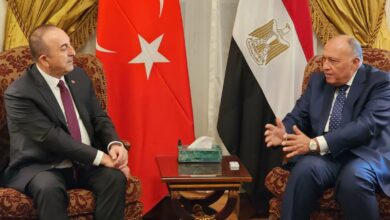Benghazi, Libya–“Your beginning was in Benghazi and you will be finished in Benghazi.” The walls of Libya’s second largest city are covered in graffiti that may be prophetic.
It was in Benghazi 42 years ago that Colonel Muammar Qadhafi started the military coup which brought him to power. In the same city last week his security brigades were defeated by anti-regime protestors in bloody battles that could prove fatal for one of the longest-serving rulers in the world.
Signs of the people’s victory are boldly emblazoned across Benghazi. Spray-painted slogans celebrate liberation and urge citizens to oust the regime and safeguard their streets.
Hated symbols of the dictator's ruthless authority–police stations, interior ministry buildings and the city’s main security compound–have been badly damaged by fires.
Residents are now firmly in control of the city, having seized all its public institutions, including the courthouse and the state radio station, which they are calling “Free Libya.”
They are dedicated to spreading the revolution to the rest of the country.
“We are seeking the liberation of all Libya, not just Benghazi. We want to build a democratic, civil state for the whole country,” said Intisar Mubarak, a leading member of the coalition for the 17 February revolution, which brought together lawyers, professionals and young activists to coordinate the Benghazi protests.
The coalition recently appointed a temporary city council composed of technocrats and activists to organize the smooth functioning of the city during the transitional period.
Fathi Terbil, a member of the council, oversees youth and civil society activities. The 39-year-old lawyer’s name is familiar to people across Libya, for many consider him to be the man who sparked the uprising.
Since March 2009, Terbil has been involved in organizing weekly demonstrations to demand full disclosure about the deaths of 1200 prisoners of conscience in Tripoli’s Abu Salim prison in 1996.
Despite threats of imprisonment–and assassination attempts on Terbil in April 2009–the small protests continued every Saturday.
“In Libya, peaceful protests are a crime that can be punishable by death,” he said, adding that many of the victims' families began to join them.
On 15 February 2011, Terbil was arrested and placed in preventative detention two days before a protest set to mark the 15-year anniversary of the Abu Salim massacre.
His arrest galvanized lawyers, human rights activists and victim's families, who took to the streets in his support. Though Terbil was released two days later, the ordeal triggered a wave of popular anger that could not be silenced.
Today Terbil is calling for a new beginning for Libya’s youth, in which they can be free to unleash their creative potential and participate in all aspects of public life.
He hopes Qadhafi will one day be prosecuted for crimes committed against the Libyan people and in other parts of the world where he was involved in sponsoring violence.
“Qadhafi’s history is very bloody,” Terbil said. “He has killed children, prisoners and many others. I hope he gets a fair trial, not for revenge, but for the sake of justice.”
Asked about the role of the international community Terbil laughs cynically. “They are waiting to see who the winner is before declaring their alliances, like they did with Tunisia and Egypt. They do not choose democracy from the very start–they choose winners even if the winners are murderers.”




